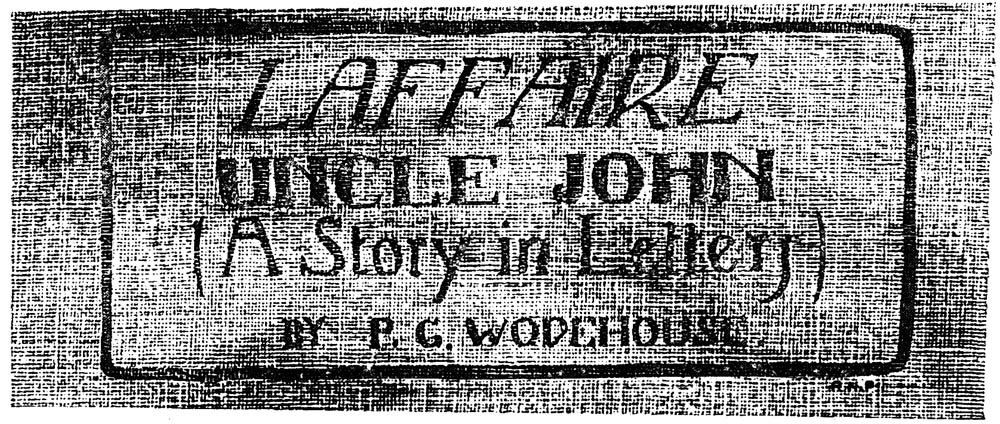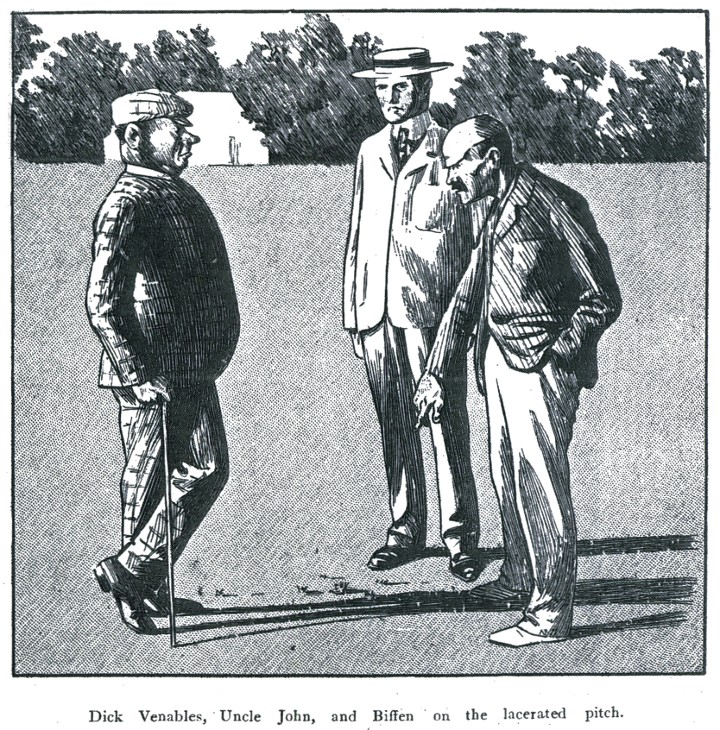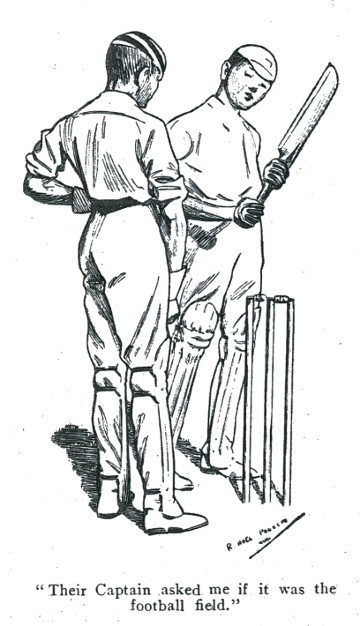Public School Magazine, August 1901

i.
From Richard Venables of St. Austin’s School to his brother Archibald Venables of King’s College, Cambridge:
Dear Archie,—I take up my pen to write to you, not as one hoping for an answer, but rather in order that (you notice the Thucydidean construction) I may tell you of an event the most important of those that have gone before. You may or may not have heard far-off echoes of my adventure with Uncle John, who has just come back from the diamond mines—and looks it. It happened thusly:
Last Wednesday evening I was going through the cricket field to meet Uncle John, at the station, as per esteemed favour from the governor, telling me to. Just as I got on the scene, to my horror, amazement, and disgust, I saw a middle-aged bounder, in loud checks, who, from his looks, might have been anything from a retired pawnbroker to a second-hand butler, sacked from his last place for stealing the sherry, standing in the middle of the field, on the very wicket the Rugborough match is to be played on next Saturday (to-morrow), and digging, digging—I’ll trouble you. Excavating great chunks of our best turf with a walking stick. I was so unnerved, I nearly fainted. It’s bad enough being captain of a school team under any circs., as far as putting you off your game goes, but when you see the wicket you’ve been rolling by day, and dreaming about by night, being mangled by an utter stranger—well! They say a cow is slightly irritated when her calf is taken away from her, but I don’t suppose the most maternal cow that ever lived came any where near the frenzy that surged up in my “buzzum” at that moment. I flew up to him, foaming at the mouth. “My dear sir,” I shrieked, “are you aware that you’re spoiling the best wicket that has ever been prepared since cricket began?” He looked at me, in a dazed sort of way, and said, “What?” I said: “How on earth do you think we’re going to play Rugborough on a ploughed field?” “I don’t follow, mister,” he replied. A man who calls you “mister” is beyond the pale. You are justified in being a little rude to him. So I said: “Then you must be either drunk or mad, and I trust it’s the latter.” I believe that’s from some book, though I don’t remember which. This did seem to wake him up a bit, but before he could frame his opinion in words, up came Biffen, the ground man, to have a last look at his wicket before retiring for the night. When he saw the holes—they were about a foot deep, and scattered promiscuously, just where two balls out of three pitch—he almost had hysterics. I gently explained the situation to him, and left him to settle with my friend of the check suit. Biffen was just settling down to a sort of Phillipic when I went, and I knew that I had left the man in competent hands. Then I went to the station. The train I had been told to meet was the 5.30. By the way, of course, I didn’t know in the least what Uncle John was like, not having seen him since I was about one-and-a-half, but I had been told to look out for a tall, rather good-looking man. Well, the 5.30 came in all right, but none of the passengers seemed to answer to the description. The ones who were tall were not good looking, and the only man who was good looking stood five feet nothing in his boots. I did ask him if he was Mr. John Dalgliesh; but, his name happening to be Robinson, he could not oblige. I sat out a couple more trains, and then went back to the field. The man had gone, but Biffen was still there. “Was you expecting anyone to-day, sir?” he asked, as I came up. “Yes. Why?” I said. “That was ’im,” said Biffen. By skilful questioning, I elicited the whole thing. It seems that that fearsome bargee, in checks, was the governor’s “tall, good-looking man;” in other words, Uncle John himself. He had come by the 4.30, I suppose. Anyhow, there he was, and I had insulted him badly. Biffen told me that he had asked who I was, and that he (Biffen) had given the information, while he was thinking of something else to say to him about his digging. By the way, I suppose he dug from force of habit. Thought he’d find diamonds, perhaps. When Biffen told him this he said in a nasty voice: “Then, when he comes back will you have the goodness to tell him that my name is John Dalgliesh, and that he will hear more of this.” And I’m uncommonly afraid I shall. The governor bars Uncle John awfully, I know, but he wanted me to be particularly civil to him, because he was to get me a place in some beastly firm when I leave. I haven’t heard from home yet, but I expect to soon. Still, I’d like to know how I could stand and watch him ruining the wicket for our spot match of the season. As it is, it won’t be as good as it would have been. The Rugborough slow man will be unplayable if he can find one of these spots. Altogether, its a beastly business. Write soon, though I know you won’t.—Yours ever,
Dick.

ii.
Telegram from Major-General Sir Everard Venables, V.C., K.C.M.G., to his son Richard Venables:
Venables, St. Austin’s. What all this about Uncle John. Says were grossly rude. Write explanation next post.—Venables.
iii.
Letter from Mrs. James Anthony (née Miss Dorothy Venables) to her brother Richard Venables.
Dear Dick,—What have you been doing to Uncle John? Jim and I are stopping for a fortnight with father, and have just come in for the whole thing. Uncle John—isn’t he a horrible man? — says you were grossly insolent to him when he went down to see you. Do write and tell me all about it. I have heard no details as yet. Father refuses to give them, and gets simply furious when the matter is mentioned. Jim said at dinner last night that a conscientious boy would probably feel bound to be rude to Uncle John. Father said “Conscience be——”; I forget the rest, but it was awful. Jim says if he gets any worse we shall have to sit on his head, and cut the traces. He is getting so dreadfully horsey. Do write the very minute you get this. I want to know all about it.—Your affectionate sister,
Dorothy.
iv.
Part of letter from Richard Venables of St. Austin’s to his father, Major-General Sir Everard Venables, V.C., K.C.M.G.:
. . . So you see it was really his fault. The Emperor of Germany has no right to come and dig holes in our best wicket. Take a parallel case. Suppose some idiot of a fellow (not that Uncle John’s that, of course, but you know what I mean) came and began rooting up your azaleas. Wouldn’t you want to say something cutting? I will apologize to Uncle John, if you like; but still, I do think he might have gone somewhere else if he really wanted to dig. So you see, etc, etc.

v.
Letter from Richard Venables of St. Austin’s to his sister, Mrs. James Anthony:
Dear Doll,—Thanks awfully for your letter, and thank Jim for his message. He’s a ripper. I’m awfully glad you married him and not that rotter, Thompson, who used to hang on so. I hope the most marvellous infant on earth is flourishing. And now about Uncle John. Really, I am jolly glad I did say all that to him. We played Rugborough yesterday, and the wicket was simply vile. They won the toss, and made two hundred and ten. Of course, the wicket was all right at one end, and that’s where they made most of their runs. I was wicket-keeping as usual, and I felt awfully ashamed of the beastly pitch when their captain asked me if it was the football-field. Of course, he wouldn’t have said that if he hadn’t been a pal of mine, but it was probably what the rest of the team thought, only they were too polite to say so. When we came to bat it was worse than ever. I went in first with Welch—that’s the fellow who stopped a week at home a few years ago; I don’t know whether you remember him. He got out in the first over, caught off a ball that pitched where Uncle John had been prospecting, and jumped up. It was rotten luck, of course, and worse was to follow, for by half-past five we had eight wickets down for just over the hundred, and only young Scott, who’s not a bat at all, and another fellow to come in. Well, Scott came in. I had made about sixty then, and was fairly well set—and he started simply mopping up the bowling. He gave a chance every over as regular as clockwork, and it was always missed, and then he would make up for it with two or three tremendous whangs—a safe four every time. It wasn’t batting. It was more like golf. Well, this went on for some time, and we began to get hopeful again, having got a hundred and eighty odd. I just kept up my wicket, while Scott hit. Then he got caught, and the last man, a fellow called Moore, came in. I’d put him in the team as a bowler, but he could bat a little, too, on occasions, and luckily this was one of them. There were only eleven to win, and I had the bowling. I was feeling awfully fit, and put their slow man clean over the screen twice running, which left us only three to get. Then it was over, and Moore played the fast man in grand style, though he didn’t score. Well, I got the bowling again, and half-way through the over I carted a half-volley into the pav., and that gave us the match. Moore hung on for a bit and made about ten, and then got bowled. We made 223 altogether, of which I had managed to get seventy-eight, not out. It pulls my average up a good bit. Rather decent, isn’t it? The fellows rotted about a good deal, and chaired me into the pav., but it was Scott who won us the match, I think. He made ninety-four. But Uncle John nearly did for us with his beastly walking-stick. On a good wicket we might have made any number. I don’t know how the affair will end. Keep me posted up in the governor’s symptoms, and write again soon.—Your affectionate brother, Dick.
P.S.—On looking over this letter, I find I have taken it for granted that you know all about the Uncle John affair. Probably you do, but, in case you don’t, it was this way. You see, I was going, etc., etc.
vi.
From Archibald Venables of King’s College, Cambridge, to Richard Venables of St. Austin’s:
Dear Dick.—Just a line to thank you for your letter, and to tell you that since I got it I have had a visit from the great Uncle John, too. He is an outsider, if you like. I gave him the best lunch I could in my rooms, and the man started a long lecture on extravagance. He doesn’t seem to understand the difference between the ’Varsity and a private school. He kept on asking leading questions about pocket-money and holidays, and wanted to know if my master allowed me to walk in the streets in that waistcoat—a remark which cut me to the quick, “that waistcoat” being quite the most stylish thing of the sort in Cambridge. He then enquired after my studies; and, finally, when I saw him off at the station, said that he had decided not to tip me, because he was afraid that I was inclined to be extravagant. I was quite kind to him, however, in spite of everything; but I was glad you had spoken to him like a father. The recollection of it soothed me, though it seemed to worry him. He talked a good deal about it. Glad you came off against Rugborough.—Yours ever,
A. Venables.
vii.
From Mr. John Dalgliesh to Mr. Philip Mortimer, of Penge:
Dear Sir.—In reply to your letter of the 18th inst., I shall be happy to recommend your son, Reginald, for the vacant post in the firm of Messrs. Van Nugget, Diomonde and Mynes, African merchants. I have written them to that effect, and you will, doubtless, receive a communication from them shortly.—I am, my dear sir, yours faithfully,
J. Dalgliesh.
viii.
From Richard Venables of St. Austin’s to his father, Major-General Sir Everard Venables, V.C., K.C.M.G.:
Dear Father,—Uncle John writes, in answer to my apology, to say that no apologies will meet the case; and that he has given his nomination in that rotten City firm of his to a fellow called Mortimer. But rather a decent thing has happened. There is a chap here I know pretty well, who is the son of Lord Marmaduke Sangazure, and it appears that the dook himself was down watching the Rugborough match, and liked my batting. He came and talked to me after the match, and asked me what I was going to do when I left, and I said I wasn’t certain, and he said that, if I hadn’t anything better on, he could give me a place on his estate up in Scotland, as a sort of land-agent, as he wanted a chap who could play cricket, because he was keen on the game himself, and always had a lot going on in the summer up there. So he says that, if I go up to the ’Varsity for three years, he can guarantee me the place when I come down, with a jolly good screw and a ripping open-air life, with lots of riding, and so on, which is just what I’ve always wanted. So, can I? It’s the sort of opportunity that won’t occur again, and you know you always said the only reason I couldn’t go up to the ’Varsity was, that it would be a waste of time. But in this case, you see, it won’t, because he wants me to go, and guarantees me the place when I come down. It’ll be awfully fine, if I may. I hope you’ll see it.—Your affectionate son,
Dick.
P.S.—I think he’s writing to you. He asked your address. I think Uncle John’s a rotter. I sent him a rattling fine apology, and this is how he treats it. But it’ll be all right if you like this land-agent idea. If you like, you might wire your answer.
ix.
Telegram from Major-General Sir Everard Venables, V.C., K.C.M.G., to his son Richard Venables of St. Austin’s:
Venables, St. Austin’s. Very well.
Venables.
x.
Extract from letter from Richard Venables of St. Austin’s to his father, Major-General Sir Everard Venables, V.C., K.C.M.G.:
. . . . Thanks, awfully. . . . .
Extract from The Austinian of October:
“The following O.A.’s have gone into residence this year: At Oxford, J. Scrymgeour, Corpus Christi; R. Venables, Trinity; K. Crespigny-Brown, Balliol.
Extract from the Daily Wail’s account of the ’Varsity match of the following summer:
. . . . The St. Austin’s freshman, Venables, fully justified his inclusion by scoring a stylish fifty-seven. He hit eight fours, and except for a mis-hit in the slips, at 51, which Smith might possibly have secured had he started sooner, gave nothing like a chance. Venables, it will be remembered, played several good innings for Oxford in the earlier matches, notably, his not out contribution of 103 against Sussex. . . .
Finis.
 Madame Eulalie’s Rare Plums
Madame Eulalie’s Rare Plums